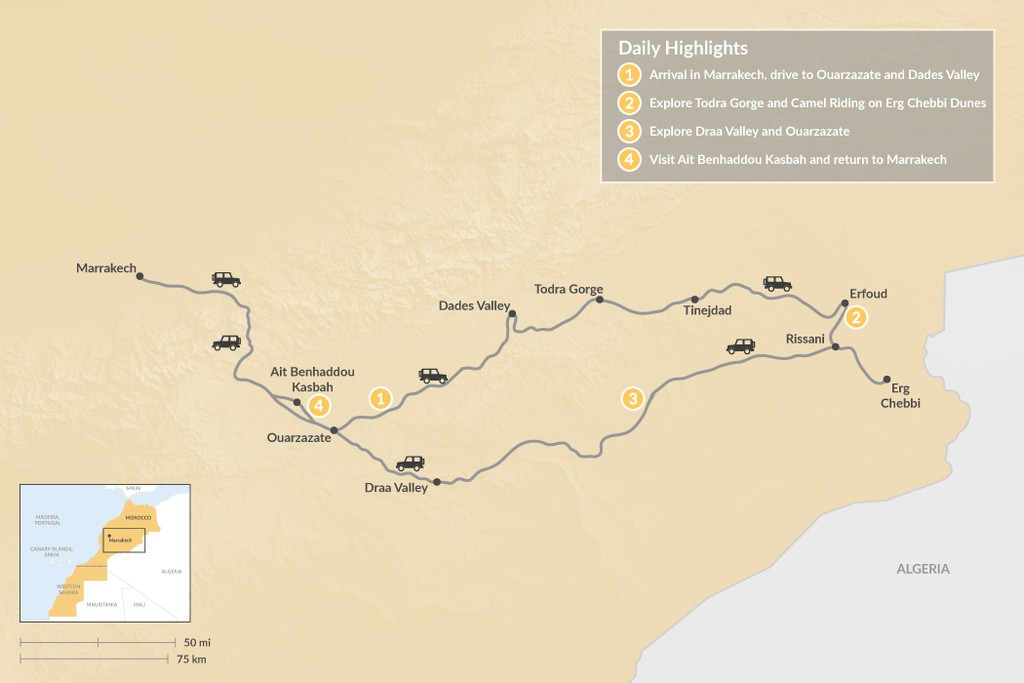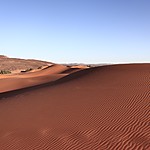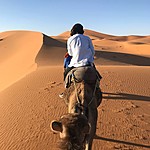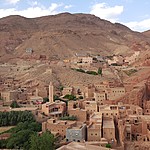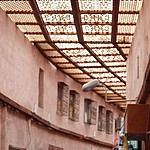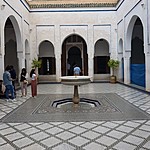
Moroccan Desert Adventure - 4 Days

Highlights
- Enjoy the natural beauty of the High Atlas mountains
- Discover lush oasis towns and picturesque Ouarzazate
- Ride a camel in the Sahara Desert
- Explore the elaborate Aït Benhaddou kasbah
Brief Itinerary
| Day | Highlights | Overnight |
|---|---|---|
| Day 1 | Arrive in Marrakesh, Scenic Transfer Through the High Atlas Mountains | Dadès Valley |
| Day 2 | Transfer to Erg Chebbi via Todra Gorge & Oasis Towns | Erg Chebbi |
| Day 3 | Transfer to Ouarzazate via Draa Valley | Ouarzazate |
| Day 4 | Return to Marrakesh via Aït Benhaddou, Depart |
Chat with a local specialist who can help organize your trip.
Detailed Itinerary
Day 1: Arrive in Marrakesh, Scenic Transfer Through High Atlas Mountains

Welcome to Morocco! After landing in Marrakesh, you'll travel from the city on a scenic drive through the High Atlas mountains. This starkly beautiful landscape is home to the Berber people, an Indigenous ethnic group found across North Africa. Along the way, you'll spot several Berber villages and farms, as well as the rivers that allow them to cultivate the harsh, rocky land. Stop for an optional visit to a traditional Berber home, where you'll be warmly welcomed and gain insight into their daily lives. Enjoy sweeping views of seemingly endless peaks and valleys as you traverse the Tizi n'Tichka Pass, and keep an eye out in the distance for Toubkal, the tallest of them all.
The High Atlas also acts as a barrier between the more mild Mediterranean climate in the north and the Saharan Desert to the south. As you continue on toward the city of Ouarzazate (pronounced like "war-za-zat"), the climate becomes noticeably desert-like. Picturesque Ouarzazate was once a major center of trade, but today is better known as the exotic backdrop seen in many of your favorite films and TV shows. From there, you'll head to the Dadès Valley, known for its lush oases and elaborate kasbahs. Kasbahs were large, square watchtower fortresses built by the landed and wealthy, and make for some of Morocco's most distinctive architecture. Spend the night in a cozy hotel nestled in the tranquil valley.
Day 2: Transfer to Erg Chebbi via Todra Gorge & Oasis Towns

This morning, you'll head east to the Todra Gorge, where a stunningly steep fault splits the deep, golden limestone in two. On the zig-zagging drive to Todra, gaze out at the lush date palmeries and jutting rock formations. When you arrive, walk along the bottom of the 984-foot (300 m) ravine by a crystal clear stream, with the spectacular rocks towering above. In the afternoon, go to the Sahara through the oasis towns of Tinejdad, Erfoud, and Rissani. Keep an eye out for camels and their shepherds on the way, a traditional nomadic lifestyle that still exists today.
Erfoud is known for its fossil preservation, and an optional visit can be made to a fossil factory to see how they extract fossils from the bedrock. Break for lunch in Rissani and explore the vibrant souk before continuing on to the deep amber sands of Erg Chebbi, a large sea of Saharan sand dunes - some over 650 feet (200 m) high! Climb onto a camel and take a ride around the dunes before a magnificent desert sunset. Enjoy a delicious Bedouin meal and traditional live music for dinner, and even learn how to play a drum the Moroccan way.
Day 3: Transfer to Ouarzazate via Draa Valley

You'll return to Rissani this morning to visit the Maison Touareg bazaar and cultural center. Learn about the tribes in this area and about the symbolism of the spectacular carpets they weave. There are plenty of other authentic handicrafts to haggle for as well, including jewelry, leather, and pewter. From there, you'll travel west through vast desert plains, mountain peaks, and acacia forests, encountering tribes along the way.
The landscape turns lush and green when you reach the fertile Draa Valley, full of palmeries, fruit trees, and farms. Stop to stretch your legs here and taste fresh produce right off the tree. Then, enter the Anti Atlas Mountains, offering views of dramatic river valleys and desolate rock landscapes on the Tizi-n-Tinififft Pass. End the day in Ouarzazate, spending the night in a charming riad, lodgings with an interior courtyard garden.
Day 4: Return to Marrakesh via Aït Benhaddou

If you'd like a bit more time in Ouarzazate, you have the option of spending the morning on a guided tour of the Taourirt Kasbah, one of the most impressive in the country. Alternatively, visit one of the city's two film studios and see where scenes from movies like "The Gladiator" and "Lawrence of Arabia" were shot. From there, you'll head to Aït Benhaddou, about half an hour west of Ouarzazate in the foothills of the High Atlas.
This kasbah is a UNESCO World Heritage Site and lies on an ancient camel caravan trade route connecting the Sahara and Marrakesh. It's a stunning example of Moroccan earthen clay architecture, with tree trunks and bamboo used for the roofs. Roam the mazelike network of narrow lanes and passageways until you come upon the many skilled artists and craftspeople who both create and sell their work here. Return to Marrakesh by late afternoon and spend the last evening exploring the main square and souk, Jemaa el-Fna, where you'll find everything from silk scarves to delicious tajine to snake charmers.
This article is based on an itinerary created by kimkim local travel specialist Ian Hardie.
More Great Morocco Itineraries
Looking for more inspiration for your trip to Morocco? Check out these other Morocco itineraries, explore different ways to spend four days in Morocco, or discover the best time to visit Morocco.
